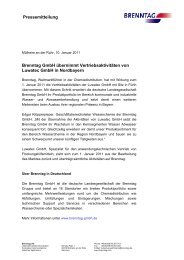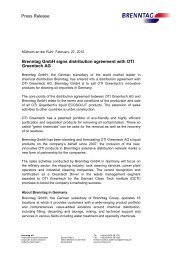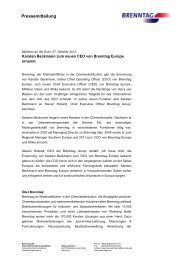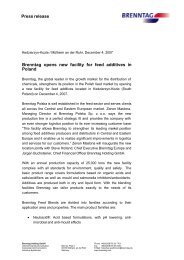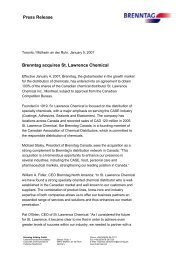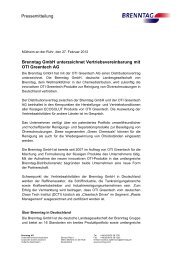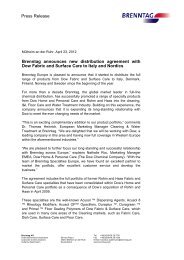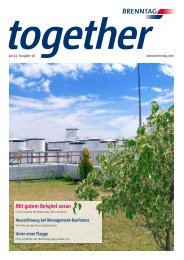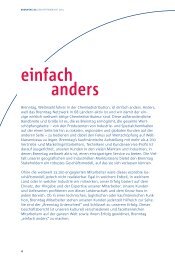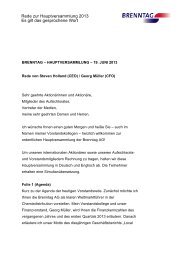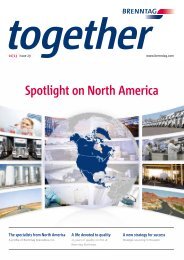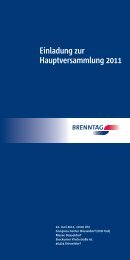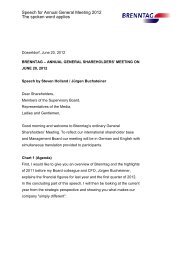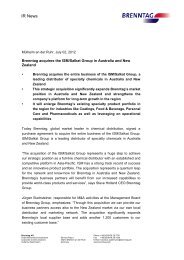PDF; 1,44 MB - Brenntag North America
PDF; 1,44 MB - Brenntag North America
PDF; 1,44 MB - Brenntag North America
Create successful ePaper yourself
Turn your PDF publications into a flip-book with our unique Google optimized e-Paper software.
SOLUTIONS 30prevalent on the <strong>North</strong> <strong>America</strong>n market. Both productsfulfil high quality standards, with DEF certified to ISO 22241and AdBlue® to DIN 70070.By marketing AdBlue® and DEF and providing reliable qualityand security of supply, we not only help our customers toadhere to the standard values set out in Euro IV, V and VI orin the Environmental Protection Agency’s (EPA) diesel emissionstandards – but we also help to ensure that as many ofour customers as possible have the opportunity to do theirbit towards reducing emissions.New markets, such as the Agricultural and Personal Carssector, are promising for the growth of AdBlue® and DEF.All new tractors and machinery are also required to meetthe new environmental standards. The majority of the newmodels will be adapting the SCR technology. A growingnumber of personal car diesel models are adapting theAdBlue® emissions control equitment to clean exhaustgases beyond current legislation levels.Product stewardship –inviting cooperationLinking chemical manufacturers and chemical users,<strong>Brenntag</strong> provides business-to-business distributionsolutions for industrial and specialty chemicals globally.With our products and services, we want to enable othercompanies to take a sustainable approach.In their Responsible Care initiative, the European ChemicalIndustry Council (CEFIC) and the Fecc have drawn up guidelineson the joint product responsibility of suppliers anddistributors: the Product Stewardship concept. Distributorsbear (joint) responsibility for the products they buy, storeand supply to their customers. To ensure high standards inthe areas of environmental protection and occupationalsafety, suppliers, distributors and users or processingcompanies need to work together closely and exchangerelevant information:• The supplier is familiar with the chemical properties of theproduct and knows the details of the production process.• The distributor handles a wide range of products and possessesin-depth knowledge of the market.• The user knows the conditions under which the productsare processed and the purpose for which the end productis used.“Product Stewardship” means a commitment to cooperationalong the entire production and supply chain as well asthroughout the product life cycle – with the aim of passingon environmentally relevant and health-related data and ensuringresponsible handling of the various products.<strong>Brenntag</strong> implements this concept to promote health, safetyand environmental protection worldwide. We are also involvedwith the efforts of chemical distributors to optimiseenvironmental and health protection. For years, our employeeshave been active members of all the committees of thenational chemical distribution associations, of the Europeanassociation Fecc, the National Association of Chemical Distributors(NACD), the International Council of Trade Associations(ICCTA) and in cross-industry working groups.Chemical leasing – innovativebusiness model with a futureChemical products are ubiquitous in modern society and inour everyday lives. Whether it’s in the garden, in the kitchenor bathroom: we come into contact with a wide range ofchemicals every day. The significance of chemicals in ourlives is undisputable. However, it is necessary to address theissue of a sustainable environmental and chemical policy thatbreaks new ground, promotes innovative ideas and keepsthe burden on humans and the environment as low aspossible.Chemical leasing – service-oriented instead of volumeorientedAs a concept, leasing is primarily associated with a financialmodel that enables a customer to benefit from a particularproduct without having to purchase it. Chemical leasing isan innovative, service-oriented and sustainable businessmodel that puts the focus on paying for the usage achieved.The central components of the model are a fair breakdownof the additional added value, high quality standards andthe mutual trust of both companies.Chemical leasing describes the process of suppliers/distributorsproviding chemicals for a particular purpose (e.g.wastewater treatment), not in a quantity-based way.Therefore, the economic success of the supplier/distributoris no longer linked with product turnover. Instead of beingpaid by the volume of provided chemicals to a customer,the payment for the supplier/distributor is now based onfunctional units such as cubic metres of purified wastewateror the number of purified pipes that are used to make thenecessary calculations. The chemical leasing modelfocuses on the common interests of suppliers/distributorsand users.As a result of payment based on usage – regardless of theamount of chemicals used – the supplier/distributor takesa major interest in reducing consumption by the user viaprocess optimisation. Chemical leasing therefore requiresthe supplier/distributor and user to optimise their chemicalmanagement to the same degree and increase the efficiencyof chemical usage.



